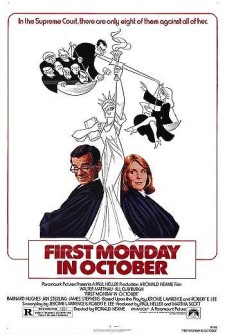Most Exciting Cases Of The New Supreme Court Term
by Natasha Vargas-Cooper

All case summaries via SCOTUSblog.
16. Snyder v. Phelps: “Does the First Amendment protect protesters at a funeral from liability for intentionally inflicting emotional distress on the family of the deceased?”
15. General Dynamics Corp. v. United States: “Whether the government can maintain its claim against a party when it invokes the state-secrets privilege to completely deny that party a defense to the claim.”
14. Federal Communications Commission v. AT&T;, Inc.: “Whether Exemption 7(C) of the Freedom of Information Act — which exempts from mandatory disclosure records or information compiled for law enforcement purposes when such disclosure could reasonably be expected to constitute an unwarranted invasion of ‘personal privacy’ — protects the ‘privacy’ of corporate entities.”
13. Schwarzenegger v. Entertainment Merchants: “Does a state law restricting the sale of violent video games to minors violate the First Amendment right to free speech?”
12. Sykes v. United States: “Whether using a vehicle while knowingly or intentionally fleeing from a law enforcement officer after being ordered to stop constitutes a ‘violent felony’ under the Armed Career Criminal Act”
11. Staub v. Proctor Hospital: “Can an employer be found liable for the discriminatory acts of supervisors, who do not themselves make employment decisions but do influence the employment decision-makers?”
10. Cullen v. Pinholster: “Whether a federal court can overturn a state criminal conviction on the basis of facts the defendant could have alleged, but did not, in state court.”
9. Bruesewitz v. Wyeth: “The National Childhood Vaccine Injury Act protects vaccine manufacturers from liability for certain injuries caused by their vaccines (giving injured patients compensation from the government instead). Does that immunity apply when the victim claims that the design of the drug created an avoidable and unnecessary risk to patients?”
8. Michigan v. Bryant: “The Sixth Amendment generally requires prosecutors to present testimonial evidence through live testimony at trial. Do statements made by a wounded crime victim to police officers about the perpetrator constitute such testimonial evidence, or can the police officer testify at trial about what the victim said?”
7. Kentucky v. King: “Under what circumstances can lawful police action impermissibly ‘create’ exigent circumstances that preclude warrantless entry?”
6. Premo v. Moore: “When a defendant has pleaded guilty, but later challenges his conviction on the ground that his lawyer should have moved to suppress his confession, is he entitled to habeas relief upon showing that his confession was coerced?”
4. Pepper v. United States: “May a court consider a defendant’s post-sentencing rehabilitation as a ground for reducing his sentence below the federal sentencing guideline range? When a sentence is vacated on appeal, and a new judge is assigned on remand, must the new judge follow the prior district judge’s sentencing findings?”
3. Virginia Office for Protection and Advocacy v. Stewart: “Does the Eleventh Amendment prohibit an independent state agency established to protect individuals with disabilities from suing state officials in federal court to obtain a court order requiring the officials to comply with federal law?”
2. Skinner v. Switzer: “When a convicted prisoner wishes to sue a state to obtain access to biological evidence for DNA testing, is he required to file a habeas petition or can he file a civil rights suit instead?”
1. Connick v. Thompson: “Can a prosecutor’s office be held liable for the illegal conduct of one of its prosecutors, on the theory that the office failed to adequately train its employees, when there has been only one violation resulting from that deficient training?”
Natasha Vargas-Cooper is passionate about the law. And “Mad Men.”
